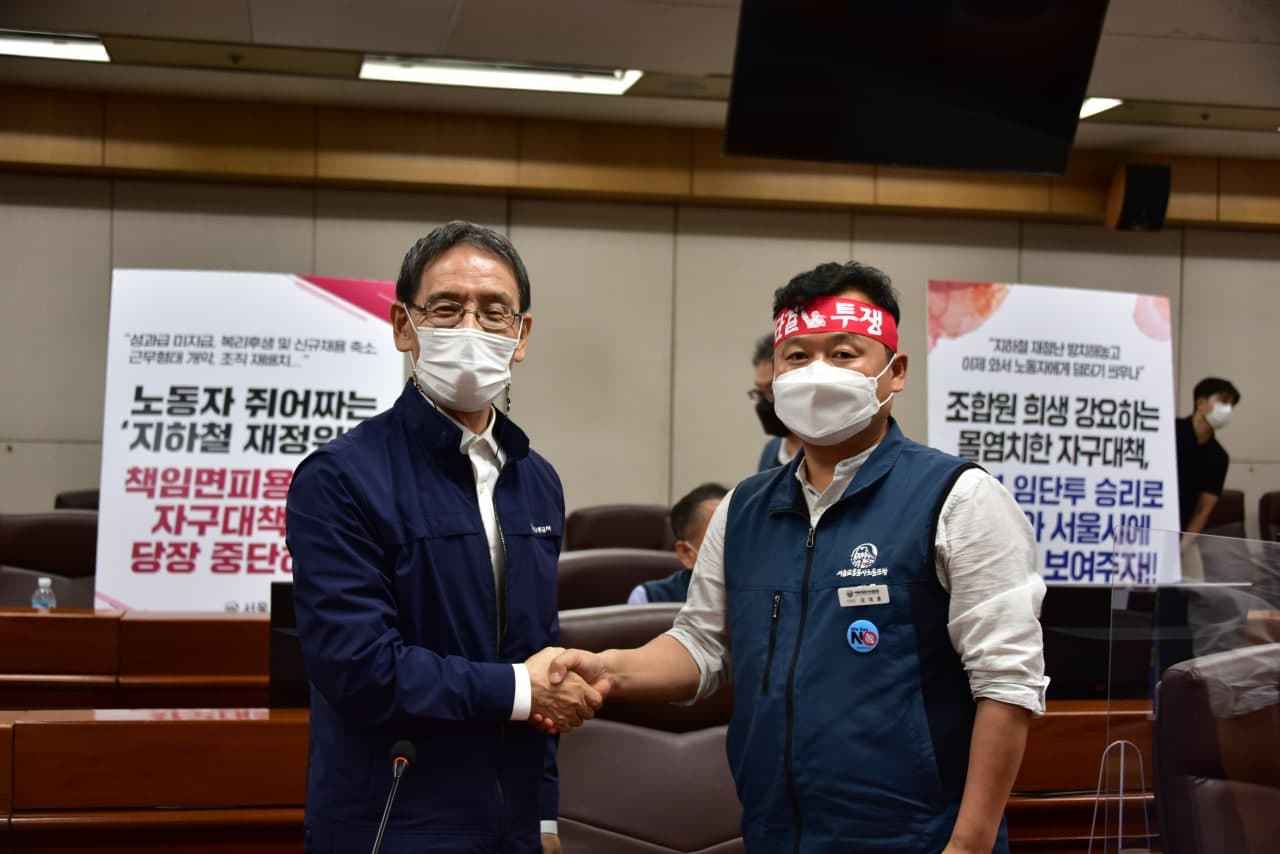Subway trains in greater Seoul area started running as usual Tuesday, after unionized workers of Seoul Metro reached a deal with management just hours before the planned walkout.
Shortly before midnight Monday, Seoul Metro announced that an agreement was reached and agreed to scrap sweeping restructuring plans at the core of the dispute. The last round of talks lasted for almost nine hours after it started at 3 p.m. Monday.
Seoul Metro said it decided to abolish the restructuring plan that involved cutting nearly 10 percent of its 16,700 employees, reducing benefits, freezing wages and partially outsourcing its works to the private sector as a means to mitigate its continuing losses.
The transit authority of South Korea’s capital has incurred more than 500 billion won ($425 billion) in losses for three consecutive years from 2019. It recorded a net loss of 1.11 trillion won from accommodating fewer passengers during COVID-19 pandemic and was on track to record its highest-ever loss of more than 1.6 trillion won this year.
Under the agreement, Seoul Metro will form a committee with representatives of the labor union to draft a new plan on curbing losses. They will also make a joint, formal request to the central government and Seoul city government in asking them to take up some of the financial responsibility.
Unionized workers had demanded the two governments to treat Seoul’s subway system the same as the state-run Korea Railroad Corp. The proposed plan would see the government foot the bill for around 60 percent of Seoul Metro’s annual losses, like it does for the national railroad operator under the Framework Act on Railroad Industry Development.
The union has argued that continued losses were partly from excessive transfer discounts and low transit fees for passengers, which has stayed frozen since 2015.
Seoul Metro’s management and union representatives also agreed to make adjustments to subway operating hours and separately negotiate on working conditions. Workers’ wages for this year will stay the same as last year, according to the deal.
The transit authority had planned to run an emergency operating system of Line Nos. 1 through 8 if the strike was to ensue, which would see subway trains operate as usual during rush hour but have longer intervals between arrivals at other times.
No major disturbances were expected even if the strike was to happen, according to Seoul city government.
Yet the conflict still drew concerns that people’s everyday lives would be disrupted ahead of the Chuseok holiday this week. The Seoul Metropolitan Government had hinted that safety could be an issue if the strike hit the largest subway system in South Korea over a prolonged period, as fewer workers would be tasked with maintenance and security jobs.
“We apologize for causing concerns to citizens while the negotiation between management and labor lasted for a long time,” said Seoul Metro CEO Kim Sang-bum in a statement provided to the press shortly after the deal was reached.
“As both labor and management agree that support from government funding for the public service is essential to resolve the financial struggle, we will overcome the crisis with exemplary labor-management relationship of mutual cooperation.”
The labor union is planning to hold a vote among its members to decide whether the union should accept the agreement as is. It is largely expected that the plan will gain support from majority of the members.
The deal could signal hope for subway authorities in other major cities to follow suit ahead of an all-out strike planned for this month.
A coalition of 11,000 unionized subway workers under the Korean Confederation of Trade Unions had warned in August they would wage a nationwide strike within this month if the government does not step up to shoulder the financial burden for all subway systems throughout Korea.
The group also blamed the subway authorities for doling out excessive fare discounts when transiting between different public transportation, especially a policy that allows free rides for those 65 and older. It also asked the government to use its budget to put a stop to the snowballing deficit as it has a responsibility to maintain public service.
The coalition consists of subway workers’ unions from Incheon, Busan and Daejeon. The subway workers’ union of Gwangju did not join the strike plan as it was under wage negotiations with the regional transit authority.
The nationwide strike plan received majority support from union members, with 78.9 percent of unionized workers from the five regions except Gwangju supporting the plan.
The breakthrough in Seoul, whose transit authority had recorded the biggest losses, paves the way for subway authorities from other regions to also reach similar agreements.
By Ko Jun-tae (
ko.juntae@heraldcorp.com)








![[Today’s K-pop] Blackpink’s Jennie, Lisa invited to Coachella as solo acts](http://res.heraldm.com/phpwas/restmb_idxmake.php?idx=644&simg=/content/image/2024/11/21/20241121050099_0.jpg)